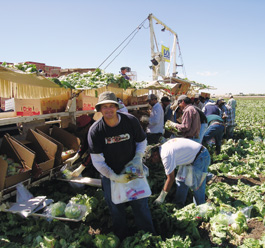home | metro santa cruz index | the arts | books | review

SALAD DAYS: In his time spent as a seasonal lettuce picker in the Imperial Valley, author Gabriel Thompson never got good enough at it to keep up with the packing machine.
Les Invisibles
A new book inspired by the Watsonville strawberry fields explores America's unacknowledged workforce
By Jessica Lussenhop
AUTHOR Gabriel Thompson may have spent two months cutting lettuce (no one says "picking lettuce," as he discovered) in the blisteringly hot fields of Yuma, Ariz., for his new book, but he had his first glimpses of the backbreaking work of immigrant laborers just outside Watsonville. "I grew up surfing Manresa and Sunset Beach," says the Cupertino-raised Thompson, a contributor to The New York Times and The Nation. "I'd often drive through the strawberry fields just off of Highway 1, and I would just pull over and watch people work. I would be very curious about what it was like to do the work and who the people were. It seemed like a completely foreign place."
This strange world in his own backyard prompted Thompson, many years later, to spend a year of his life working first in the fields, then in a chicken slaughterhouse in Alabama, then in a flower shop and finally as a delivery boy in Manhattan. He'll be appearing at the Capitola Book Cafe on Thursday to discuss the resulting book, Working in the Shadows: A Year of Doing the Jobs (Most) Americans Won't Do (Nation Books; 320 pages; hardback).
"No matter where you fall on the immigration question, it would probably be helpful before you become so certain of your ideas to understand what they go through," he says. "People are generally ignorant about what the day-to-day life experience of immigrants is, and how this work is benefiting even the most anti-immigration activists."
In a world increasingly interested in local, organic and slow food, Thompson imagined consumers not only asking "Is it organic?" but also "Are the farm workers getting a living wage?'" So in 2008 he challenged himself to highlight that need by getting these invisible jobs and keeping them.
It wasn't as easy as it sounds. Working in the lettuce fields left Thompson physically drained, and he never did get good enough to consistently keep up with la maquina, the machine that putters along the rows driving the pace of the crews. Surviving the gauntlet of reckless town cars by bike was another obstacle, as was the mind-numbing repetition of ripping chicken breast after chicken breast in two. But toughest of all was coping with the psychological terror of a browbeating flower shop boss.
"They treated their workers as if they merited no respect. From the very beginning, they'd be shouting at you," he says. "It's not just low wages, low benefits, but that they'd have to deal with very abusive bosses."
The point of the long hours, bad wages and physical degradation, he says, was to bring readers closer to the surprisingly difficult work that anti-immigration pundits claim is being stolen from Americans. Thompson's lettuce crew was astounded he lasted two months, unlike the other gringos who quit after one day, and he didn't even survive two months at the other jobs; he was fired first. "How I earned my U.S. citizenship—I did nothing. My co-workers fled civil war, picked tomatoes and are surviving in industries that very few people can keep doing. It's hard to say in any way I've earned my citizenship in any way they haven't," he says.
Furthermore, although he had to cover up his journalistic intentions from the workers who became his friends, he found their desire to be understood came out organically. "Many times people would tell me, 'When you finish doing this job, you should really go tell your friends, your fellow white friends, what it's like to cut lettuce.' They had a sense that Americans didn't have any knowledge about what it was like to do the work, not only how hard it was but how skilled it was," he says. "They said, 'You really have an opportunity to tell people about the work we do here.'"
GABRIEL THOMPSON, author of 'Working in the Shadows: A Year of Doing the Jobs (Most) Americans Won't Do,' appears Thursday, Feb. 25 at 7:30pm at Capitola Book Cafe, 1475 41st Ave., Capitola. Free. 831.462.4415.
Send a letter to the editor about this story.
|
|
|
|
|
|